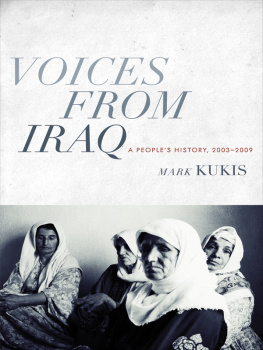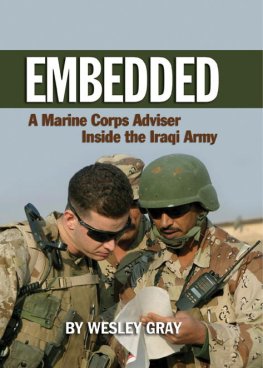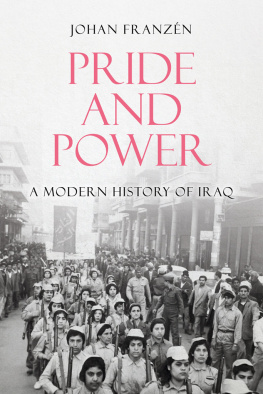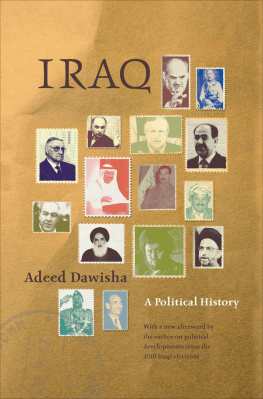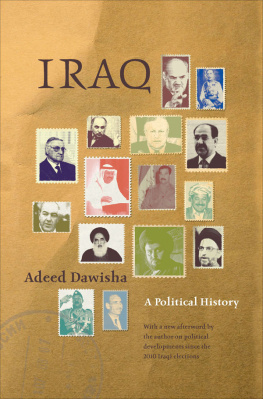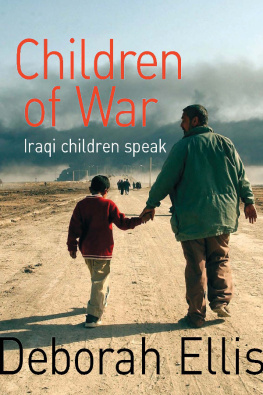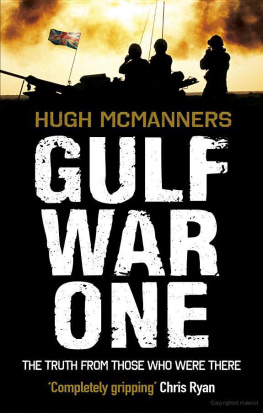VOICES FROM IRAQ
VOICES FROM IRAQ
A PEOPLES HISTORY, 2003 2009
MARK KUKIS
COLUMBIA UNIVERSITY PRESS NEW YORK

COLUMBIA UNIVERSITY PRESS
Publishers Since 1893
New York Chichester, West Sussex
cup.columbia.edu
Copyright 2011 Columbia University Press
All rights reserved
E-ISBN 978-0-231-52756-9
Library of Congress Cataloging-in-Publication Data
Voices from Iraq : a peoples history, 20032009 / [compiled by] Mark Kukis.
p. cm.
Includes bibliographical references.
ISBN 978-0-231-15692-9 (cloth : alk. paper)ISBN 978-0-231-52756-9 (ebook)
1. Iraq War, 2003 Personal narratives, Iraqi. 2. IraqHistory2003 I. Kukis, Mark, 1973 II. Title.
DS79.766.A1V645 2011
956.7044'30922DC22
2010045331
A Columbia University Press E-book.
CUP would be pleased to hear about your reading experience with this e-book at .
References to Internet Web sites (URLs) were accurate at the time of writing. Neither the author nor Columbia University Press is responsible for URLs that may have expired or changed since the manuscript was prepared.
DESIGN BY VIN DANG
TO SARAH

CONTENTS

WHEN I STARTED COVERING Iraq for Time magazine in the fall of 2006, going onto the streets of Baghdad to interview Iraqis was nearly impossible. Sectarian violence was at its height. Dozens of bodies littered the streets every morning, the bloody leavings of Shiite death squads who had roamed Sunni neighborhoods the night before. Each afternoon brought a steady drumbeat of car bombs across the city. I heard between two and five every day for months when I first started coming to Iraq. Some thumped ominously in the distance across the vast cityscape of Baghdad, barely audible from the confines of the private compound where the magazines bureau sat outside the Green Zone. Others rocked our house, sending all of us inside crouching toward the floor as curls of smoke rose from a nearby street.
In those days, it was almost suicidal to consider venturing out to talk to Iraqis for any real length of time. Like most reporters working for big media outlets, I had a bodyguard detail to accompany me anywhere I might go. We traveled in two cars on the rare occasions when we did go into the city. I would ride in the front car with a driver and a gunman armed with pistols and Kalashnikovs. A chase car followed us with two more bodyguards similarly armed. Even this was not enough protection during Baghdads bloodiest days, however. Some attacks on Westerners during that time involved dozens of armed men with heavy guns. There was even one instance in which a Western consultant was kidnapped from an Iraqi government agency in broad daylight, along with his entire team of bodyguards.
There was danger to consider beyond my personal safety as well. My bodyguards and drivers were all Iraqis, not Western security men. They lived in homes across Baghdad and kept their work with me and Time secret to all but their closest confidants. Any time they appeared in public with me brought the risk that they might be seen by killers who would come for them or their families later. This threat was no abstraction or baseless fear. The magazines initial Baghdad bureau manager, Omar Hashim Kamel, was shot to death on his way to work one morning in March of 2004. His killers were never found. My Iraqi colleagues were so fearful for their safety that they would never mention me by name outside of the bureau. Instead, they referred to me using two codenames, Farouq and Malik. They even entered those names into their cell phones instead of my own, in case they ever fell into the hands of militiamen, insurgents, or kidnappers.
Moreover, if I were to visit an Iraqi at his or her home or office with my drivers and bodyguards, I risked bringing danger to our host. Insurgents and militiamen had eyes all over the city, it seemed. Many of my colleagues who had covered Iraq in the years before I arrived told stories of how they went to interview an Iraqi, who soon afterward received threats. And unlike me, most Iraqis did not have the luxury of living under armed protection at all times.
I found myself in those early months of covering Iraq right in the middle of Baghdad but unable to see Iraq or Iraqi society in any real way. It was an impossible situation in many regards as a correspondent tasked with reporting on the country. So, I did what most journalists dida lot of embedded reporting with the U.S. military. For roughly the next two years I spent much of my time in Iraq with U.S. troops in trouble spots around the country like Ramadi, Diyala province, Samarra, and Mosul. And of course I went along with U.S. troops in the many neighborhoods of Baghdad that became synonymous with sectarian violence, places like Ghazaliya, Dora, and Mansour. Such combat reporting had its dangers, but at least when embedded I did not impose the risk of death on anyone who wasnt facing it already.
Understanding the violence in Iraq was difficult sometimes for me as a journalist, because the phenomenon often appeared so intricate. The overthrow of Saddam Hussein unleashed a number of dangerous political currents that ran unchecked, gathering a terrifying force in the first two years of the war. A nationalistic guerilla movement had sprung up amid the presence of U.S. troops. Then just as quickly, that Iraqi resistance morphed into an insurgency dominated by Sunni radicals who drew inspiration from the ideology of Osama bin Laden. Shiite militias like the Mahdi Army formed at the same time, pitting themselves against occupation forces as well as the Sunni fighters, who were increasingly bent on sectarian violence and came to call themselves al-Qaeda in Iraq. Amid all this, meanwhile, violent criminality swept the country like an epidemic and became interwoven with the burgeoning militias and insurgency.
By 2006, on any given day in Iraq, people were killing each other for revenge, profit, ancient sectarian hatreds, or modern political gain. Often many reasons seemed to come together at once in the minds of those who had a hand in Iraqs violence, but usually only one was enough to set off carnage as lawlessness prevailed across the country. The result was not so much a civil war, as some believed. Rather, Iraq after the U.S. invasion simply fell into anarchic convulsions of mass violence, shaking the society to its core and nearly tearing the nation apart.
Iraqis often refer to the U.S. invasion and the period afterward as the collapse. Its an apt description. The shattered remnants of the government only crumbled further rather than reforming into a new state. Disparate factions of Iraqi society who had once coexisted now drifted apart amid deepening mutual suspicions. The country itself was physically breaking down as well. You could see damage everywhere in the bullet scars and bomb craters. You could sense the depth in the decay of so many streets, buildings, farmlands, and oil fields all over the country. In many ways Iraq as a nation simply fell in on itself soon after invasion forces arrivedand then began to burn like a collapsed house ablaze with everyone inside.
When not out reporting around Iraq with the U.S. military, I wrote and recovered at the magazines Baghdad bureau, a comfy little villa with sandbagged windows tucked into a compound surrounded by blast walls. There was a good Internet connection, generators for when the electricity failed, home cooking, and the warm friendship of the bureaus Iraqi staff, most of whom had worked with Time since 2003. Through them I began to hear my first in-depth stories about Iraqi life during the past years of war. They told me their own stories. They told me stories of their neighbors and relatives and stories they had heard second- or thirdhand.
Next page
